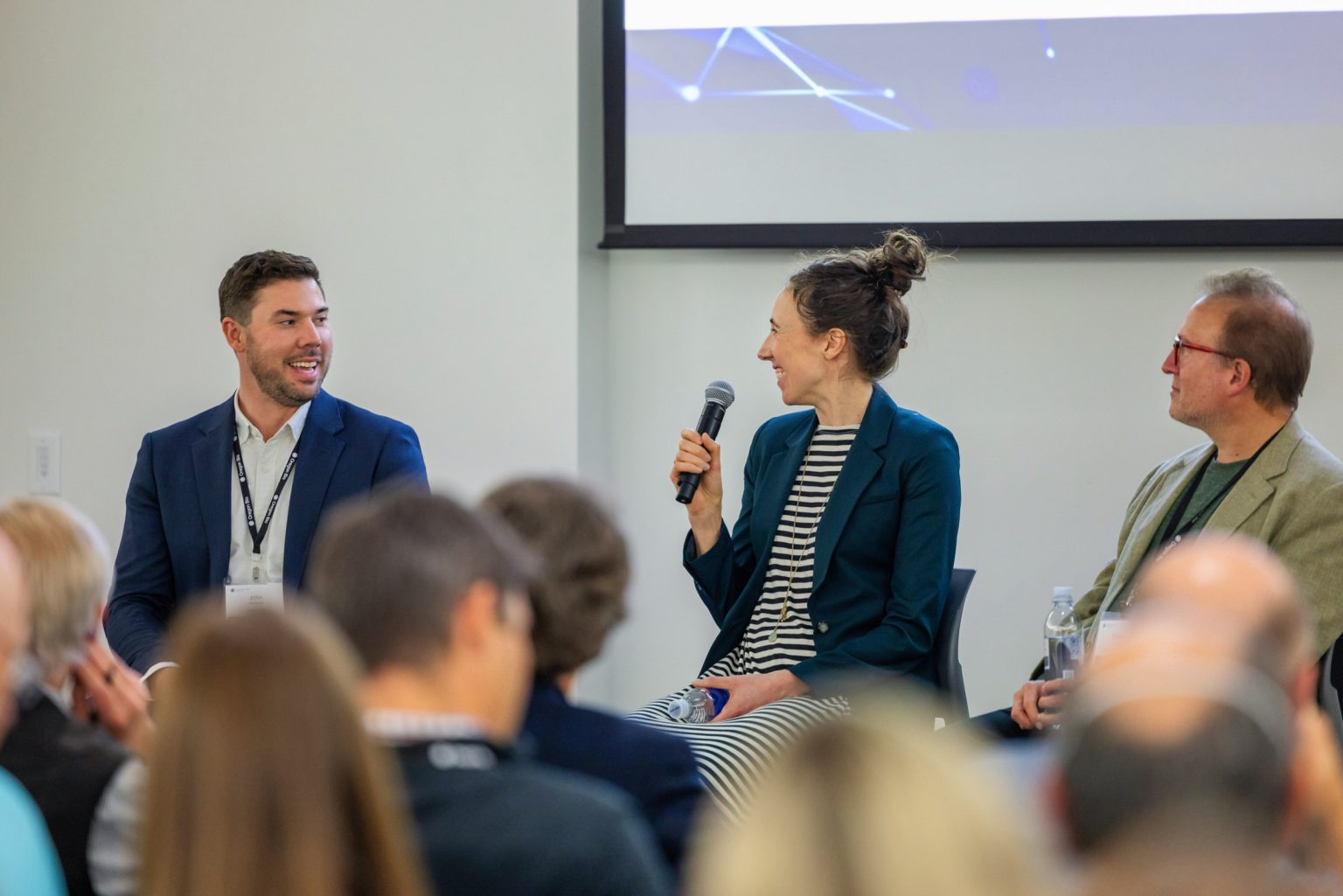Oregon Bio Panelists: ‘If we knew now….’

By Dianne Danowski Smith, APR, Consultant
Looking over the long history of Oregon Bio’s industry conferences and pitch events, we asked ourselves about founders and researchers who had won previous showcases, and wondered what wisdom they had gained in their journeys?
Three industry veterans – John Harkness, Ph.D., David A. Katz, Ph.D. and Holly Rockweiler – shared at the Oregon Bio Biotech Summit 2023, along with other informative panelists of professionals designed to spur thinking, industry development and important conversations. But where are they now and what lessons have they each learned in launching and growing their respective bioscience firms?
President/CEO John Harkness Ph.D., leads Rewire AI (formerly Rewire Neuroscience), winning his share of competitions. “Rewire AI’s purpose is to accelerate human efficiency in healthcare. Our ‘AI-As-A-Service’ platform provides adaptive, integrated machine learning (ML) to enterprise diagnostic device partners, which improves their speed, accuracy and sensitivity of biomedical imaging.”
He adds Rewire’s ML platform, called Sightologist.ai, supports end-to-end ML pipelines, resulting ultimately in adaptation of models to deliver highly accurate detection and quantification of protein and cellular biomarkers to end users.
Was there a formative moment early on for Rewire AI? “I wish I could pinpoint one thing that really made the difference between those early years and ‘taking home the check’. In reality, there were a number of things that we improved and did better. For one, I know we had a better understanding of our market, our customer, and had started to see product-market fit. We’d also started building a more sound business model. Those pieces really helped investors better understand Rewire’s potential and made it easier for me to tell Rewire’s story.”
John shared his one nugget. “I wish I had understood from the beginning how important these fundamentals are to growing a successful business, rather than hoping that the technology was so amazing that it would solve for all the things I didn’t know or understand. But as a first-time founder, that lesson can take time and refining my understanding of our customer, market, and model continues to be where I focus a lot of my time and energy.”
David Katz, Ph.D., founded and serves as the Chief Scientific Officer of Sparrow Pharmaceuticals, Inc. His company’s win in our 2019 Company Showcase helped spur expansion of the Pitch Challenge to include both early-stage as well as later-stage startups. Sparrow Pharmaceuticals is an emerging clinical-stage biopharmaceutical company developing novel, targeted therapies for disorders of corticosteroid excess. Appreciating the win, David notes, “The real values of pitch competitions are networking and experience.”
Four years hence, Sparrow raised a $50 million Series A at the end of 2020 led by OrbiMed Advisors. “We’re a geographically dispersed team with members across multiple U.S. states and in the United Kingdom, with three active Phase 2 clinical trials in polymyalgia rheumatica, Cushing’s syndrome and autonomous cortisol secretion.”
What advice would David give to newer and/or emerging companies, especially those who plan to pitch in the future? “There are no substitutes for good grammar, clear slides that complement what you say, and confidence on stage. When I watch a pitch as an investor, if the presenter doesn’t have those three core elements, it almost doesn’t matter how great is what they have to pitch.”
At the 2016 Oregon Bio Company Pitch Showcase, Holly Rockweiler’s startup, Madorra, won the ‘audience favorite’ vote. The young company she co-founded and now leads as CEO has created a medical device solution for treating vaginal dryness. Madorra had moved to Oregon the year before and she viewed the pitch opportunity the best way for herself and her company colleagues to meet others in the startup ecosystem.
Regarding Madorra’s pitch strategy, Holly said, “I always think about my audience in a pitch. I want them to remember our company. And often the words you say are less important than how you say them. I try to bring energy and something memorable to every pitch. As well as a clear message around why what we’re doing matters.”
What about now? “We’ve gone on to make huge strides. After our OR Bio pitch, we raised our Series A, ran 3 clinical trials with our device, and achieved FDA breakthrough designation. We’re currently raising our next round.” In November, 2021, Madorra was named of Oregon’s best wellness startups by Avestria Ventures.
Ultimately Holly notes advice she would (and likely does) give to smaller and emerging interests, “Know your customer and know your audience. And if you’re nervous about speaking in front of a large group, practice so many times you could say your pitch in your sleep. Also, power posing before a big pitch always helps me.”
Adds Rewire AI’s Harkness, “Today, Rewire AI is doing well and continuing to grow. We were able to hit some significant revenue milestones in 2023. I think the best advice I could give myself back when we started in 2019 or to another founder starting today is to not let a “no” discourage you. There are lots of reasons an investor or a partner might not see your particular company as a good fit for them (and there will likely be lots of nos), and many of those reasons have more to do with timing or fit or internal factors than they do with you, your idea, or your company. But those nos can be very useful learning moments. Listen to what the currents are indicating and when they are pointing in a better direction.”
“And when the nos start becoming a lot of weight to bear, remember that we have an amazing community of startups in Oregon with founders who can relate to what you’re going through. Reach out, ask for advice, and remember that you’re not alone.”
